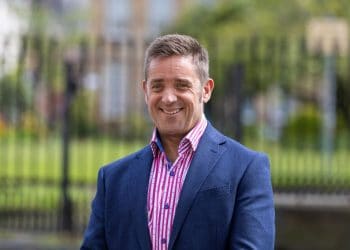
The Lake District lost a true champion of its native dialect with the death of Tommy Coulthard, of Glasson Court, Penrith, aged 96.
Tommy joined the Lakeland Dialect Society in 1977, went on to serve as its chairman and president and transmitted his enthusiasm for this traditional language of the area at countless events. Earlier this year he was awarded the British Empire Medal for his service to heritage and the community in the Lake District.
Born in Thackthwaite, in the Lorton Valley, he moved with his family to nearby Beck House six months later. It was there he spent his childhood with parents Joe and Mary Jane and his siblings Grace, William, John, Betty and Mary. He attended Loweswater School and later Fairfield Boys’ School, Cockermouth.
He left school at the age of 14 and went into farming as a hired lad, firstly on his uncle’s farm at North Row, Bassenthwaite, and later around the west of the county, from Low Arlecdon Farm, near Frizington, to Godferhead, Jenkin Farm and Beech Croft, Mockerkin, before he took to his motorbike and crossed to Westmorland.
He worked at Widewath Farm, Helton, and then Wreay Farm, Watermillock, where he met his future wife Jessie Woof. The pair were married at St Andrew’s Church, Dacre, in 1957. They had two children, Margaret and James, and lived happily in Watermillock for 60 years, first at Leeming New Lodge, then Leeming Farm and finally Gowbarrow Cottages. From there he moved to Penrith in 2014.
It was in 1960 that Tommy joined Ullswater-based builder Len Horn, helping to build the dormitory block at the Ullswater Outward Bound Centre and a number of bungalows on the Gowbarrow road.
He eventually joined the Outward Bound Trust as estate man in 1969 and continued to do this job until he retired in 1992.
Sadly, Jessie died within weeks of his retirement.
His immense practical knowledge and experience of farming and country ways was valued by many. He gave freely of his time to many organisations and causes, raising money for charity and helping out practically in any way he could.
A lover of singing and entertaining, he took part in an international folk dance festival at the Royal Albert Hall, London, in the 1950s and was a stalwart of the Mellfell Players, based in Watermillock, performing for many years in their pantomimes and plays.
He regularly took part in hunt sing-songs and shepherds’ meets around the county from the 1960s to the 1990s, as well as being an active member of the men’s choir at Penrith Methodist Chapel. For him, the culture and the singing were one and the same.
From the 1960s to the 1990s carol singers would tour Watermillock homes and hotels at Christmas and from 1973 he took on the organisation of this, raising thousands of pounds for many charities.
Then, in 2007, he started arranging merry neets with friends at Penrith auction mart, raising more than £12,000 for charities including Hospice at Home, the Great North Air Ambulance Service and Macmillan Nurses.
Tommy was also a dedicated member of the Lakeland Dialect Society, joining its committee and becoming chairman in 2004. In 2014 he stepped down as chairman and became vice-president then president — a position he held until earlier this year when he passed on the mantle to Jean Scott-Smith.
He was always a great supporter of the dialect, celebrating and promoting it wherever and whenever the opportunity arose. He helped to put on sell-out shows at Keswick’s Theatre by the Lake, again raising thousands for charity as well as publicity for the society.
He worked with other dialect societies to establish the National Dialect Festival and encouraged young farmers’ clubs to enter dialect competitions as part of their field days.
Other interests and responsibilities during his time at Watermillock included being a churchwarden, member of the parish council, representative on the Lake District National Park Authority and member of the village hall committee. He helped out at Patterdale Dog Day for 50 years. He aimed to visit every local show every summer — as a competitor showing his woodworking and stick making skills, or just catching up with friends and acquaintances.
He retired as a churchwarden at Watermillock in 2011 but continued to take care of the churchyard there until he was past the age of 90 and was among the first to set aside areas for wildlife.
In 2020 he published his life story, Tommy’s Tyale, again raising money for Hospice at Home. In it he details a way of life disappearing even as he was growing up — a simple life which began in a living room with floors of riven slate covered by prodded rugs and water brought into the house in buckets from a beck.
His early farming experiences included working on smallholdings where 12-15 cattle would be milked by hand. Most families would keep a pig to be slaughtered at home and with every piece used for food — apart from the bladder which would be blown up to be used as a football.
Louise Green, vice-president of the Lakeland Dialect Society, helped him edit the book. She said: “Tommy had a remarkable ability to welcome such a wide range of people into his friendship circle. Anyone fortunate enough to fall into his company would come away feeling richer in so many ways.
“He claimed to be able to knock on a door in any village or town in Cumbria and greet a friend — and I’m sure that’s true. His interest in and understanding of Lakeland and its people grew through the years and never diminished, something that readers of the letters pages of the Herald will recall. The loss of his knowledge of country ways and memory of times past is profound.”
He is survived by his daughter Margaret and son James, their partners Peter and Lizzie, grandsons Robbie and Luke and companion of 30 years Doreen Lund.































